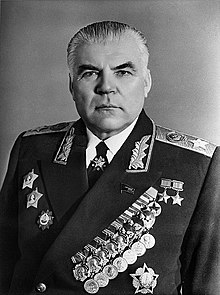
Back Rodion Malinofski Afrikaans روديون مالينوفسكي Arabic روديون مالينوفسكى ARZ Rodion Malinovski Azerbaijani Малиновский Родион Яковлевич Bashkir Радзівон Якаўлевіч Маліноўскі Byelorussian Радзівон Маліноўскі BE-X-OLD Родион Малиновски Bulgarian Rodion Malinovski Catalan Rodion Jakovlevič Malinovskij Czech
Rodion Malinovsky | |
|---|---|
Родион Малиновский | |
 Malinovsky in 1958 | |
| Minister of Defence of the Soviet Union | |
| In office 26 October 1957 – 31 March 1967 | |
| President | Nikita Khrushchev Leonid Brezhnev |
| Preceded by | Georgy Zhukov |
| Succeeded by | Andrei Grechko |
| Personal details | |
| Born | 23 November 1898 Odessa, Russian Empire |
| Died | 31 March 1967 (aged 68) Moscow, Russian SFSR, Soviet Union |
| Resting place | Kremlin Wall Necropolis, Moscow |
| Political party | Communist Party of the Soviet Union (1926–1967) |
| Spouse(s) | Larisa (1925–1946), Raisa (1946–1997) |
| Awards | Hero of the Soviet Union (2) |
| Military service | |
| Allegiance |
|
| Branch/service | |
| Years of service | 1914–1967 |
| Rank | Marshal of the Soviet Union (1944–1967) |
| Commands | Southern Front 66th Army 2nd Guards Army Southwestern Front 3rd Ukrainian Front 2nd Ukrainian Front Transbaikal Military District Far Eastern Military District |
| Battles/wars | |
Rodion Yakovlevich Malinovsky (Russian: Родио́н Я́ковлевич Малино́вский, Ukrainian: Родіо́н Я́кович Малино́вський, romanized: Rodion Yakovych Malynovskyi; 23 November [O.S. 11 November] 1898 – 31 March 1967) was a Soviet military commander and Marshal of the Soviet Union. He served as Minister of Defence of the Soviet Union from 1957 to 1967, during which he oversaw the strengthening of the Soviet Army and helped build up the image of the Soviet Union as a military superpower.
Born to an impoverished Ukrainian household in Odesa, Malinovsky volunteered for the Imperial Russian Army during the First World War and served with distinction in both the German Front and the Western Front. He was serving in the Russian Legion in France on the outbreak of the October Revolution, after which he returned to Russia and joined the Red Army in the Russian Civil War. After graduating from the Frunze Military Academy, Malinovsky volunteered to fight on the Republican side during the Spanish Civil War, where he again served with great distinction and was later awarded the Order of Lenin and the Order of the Red Banner in recognition of his service.
Malinovsky emerged as one of the few competent Soviet generals in the opening phase of the German invasion. He played a crucial role in the Soviet victory at Stalingrad in December 1942, and helped drive German troops out of Ukraine following the Dnieper–Carpathian offensive. He then commanded the Soviet drive into the Balkans, forcing Romania to switch to the Allies side, for which he was made a Marshal of the Soviet Union by Joseph Stalin. He further took part in the liberation of Budapest, Vienna and Prague, cementing Soviet military supremacy in Central Europe. After the German surrender in May 1945, Malinovsky was transferred to the Far East, where he crushed the Japanse Kwantung Army in the Soviet invasion of Manchuria. He received the Soviet Union's highest distinction, the title Hero of the Soviet Union, as a reward.
After the war, Malinovsky remained in the Far East and held a succession of important commands. After Stalin's death, Nikita Khrushchev recalled Malinovsky to Moscow and named him commander-in-chief of the Soviet Ground Forces. In 1957, he replaced the ousted Georgy Zhukov as Minister of Defence, a position he served until his death. Malinovsky was a strong advocate for the importance of conventional forces, and maintained a delicate balance with Khrushchev's missile-based approach regarding Soviet military policy. He retained considerable autonomy in military affairs following the fall of Khrushchev in 1964. Malinovsky died in March 1967 from pancreatic cancer, and is remembered as one of the most important military leaders in Russian and Soviet history.
© MMXXIII Rich X Search. We shall prevail. All rights reserved. Rich X Search